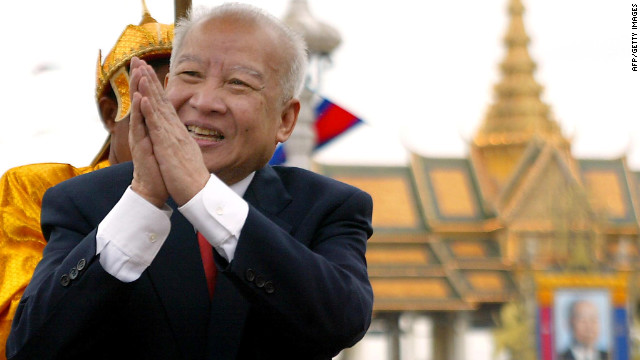October 15, 2012

Sihanouk died of natural
causes after having been treated by Chinese doctors for years for
various forms of cancer, diabetes and hypertension, China's state-run
Xinhua news agency reported, citing Cambodian Deputy Prime Minister
Nhik Bun Chhay.
The "royal government"
will bring the late king's body back to his homeland for a traditional
funeral, according to Cambodia's official AKP news agency. Xinhua
reported that Sihanouk's son, King Norodom Sihamoni, will fly to
Beijing later Monday to receive his father's body for burial.
Health problems led
Sihanouk to announce his abdication in October 2004 while he was in
Beijing for treatment, according to the king's official website.
A panel elected Sihamoni
as the new king. Cambodia's National Assembly then decided to give
Sihanouk the title of King Father, allowing him the same privileges he
has as the reigning monarch, according to his website.
Sihanouk saw Cambodia go
from French rule to independence, then to the brutal Khmer Rouge regime
and the guerrilla war that followed its toppling. He then watched his
country develop into the constitutional monarchy it is today.
He came from a royal
lineage, but it was France that placed Sihanouk on the throne in 1941,
according to the foreign ministry of Australia, which has played a key
role in Cambodia's transition toward peace.
The king dissolved the nation's parliament in 1953, which helped bring about Cambodia's independence.
Two years later, he
abdicated the throne to his father but remained active as Cambodia's
prime minister. In 1960, he became the South Asian nation's head of
state following his father's death.
In the 1960s, amid a
region simmering with conflicts such as the Vietnam War, Cambodia soon
became home to a number of North Vietnamese training camps. That
prompted U.S. air strikes on those camps in 1969.
The following year,
U.S.-backed Gen. Lon Nol declared a coup d'etat while the king was on
an official visit to the Soviet Union and abolished the monarchy.
Sihanouk aligned with the Khmer Rouge, a growing ultra-Maoist group which sought to transform Cambodia into an agrarian utopia.
The king, forced into exile in China, led the resistance movement, while the Khmer Rouge gradually gained strength.
When the group, led by
Pol Pot, won control of Cambodia in 1975, Sihanouk returned as head of
state. But by the following year, he was placed under house arrest.
From 1975 to 1979, Khmer Rouge led
a bloody period of mass killings, public executions and torture
centers. While no one knows for certain how many people were killed by
the regime, experts estimate 1.7 million fatalities -- or at least a
quarter of Cambodia's population died from executions, diseases,
starvation and overwork.
Sihanouk himself lost
five children and 14 grandchildren at the hands of the Khmer Rouge. He
was confined to the royal palace until Pol Pot was overthrown three
years later. He was away from Cambodia from 1979 to 1991.
The king subsequently
became president of the new republic, but it wasn't until 1993 -- when
Cambodia held its first parliamentary elections -- that the king's
powers were restored and Cambodia became a constitutional monarchy.
Elizabeth Becker, the
author of "When the War Was Over: Cambodia and the Khmer Rouge
Revolution," told CNN after the king abdicated in 2004 that Sihanouk
was "larger than life" and brought both good and bad to his country.
He tried to bring
Cambodia into the modern world and protect it from its neighbors, but
he brought about divisions in the process, she said.
"He threw his prestige
and politics behind the Khmer Rouge when they started the rebellion and
it was his name that helped convince a lot of peasants to go along with
the Khmer Rouge," Becker told CNN.
"Then later, after the
Vietnamese invasion, he continued to help the Khmer Rouge at the United
Nations with political prestige, so his is a very checkered legacy."



No comments:
Post a Comment